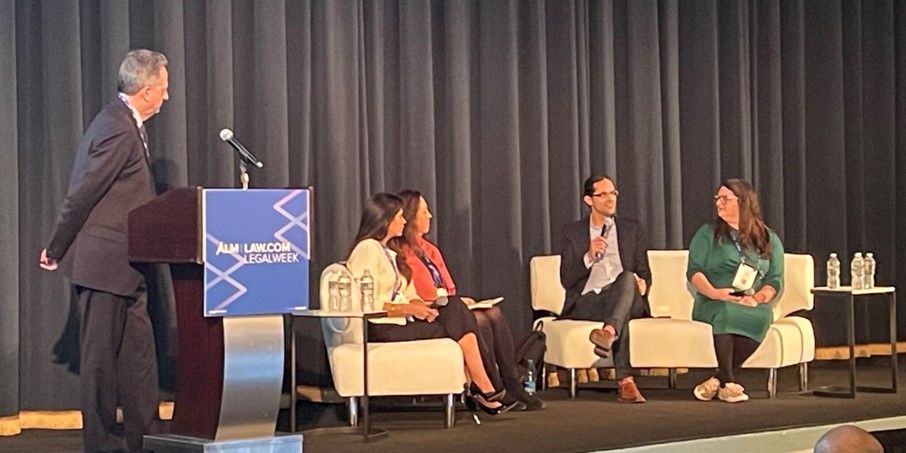

Advice

Generative AI in Action: Dynamic Strategies for Today's Legal Landscape
- Legal Transformation
Legalweek NY 2024 Session Recap
Generative AI is poised to make a significant impact on the legal sector, enhancing the practice of law with innovative and efficient solutions. At Legalweek 2024, we explored the effects of this groundbreaking technology during Epiq’s session, "Generative AI in Action: Dynamic Strategies for Today's Legal Landscape". This blog post summarizes the discussion and expertise shared by industry professionals, offering a glimpse into the evolving landscape of legal technology.
Richard Robbins, Epiq Legal Solution’s Managing Director of Applied Artificial Intelligence hosted the panel. The panelists included:
- Kelly G. Clay, Assistant General Counsel and Global eDiscovery Counsel, GSK
- Sandra Metallo-Barragan, eDiscovery Counsel, Proskauer Rose LLP
- Lydia Petrakis, Senior Corporate Counsel and Digital Strategist in Microsoft’s Corporate, External, and Legal Affairs (CELA) department
- Daryl Shetterly, Managing Director, Orrick Analytics
Introduction
Generative AI is a form of artificial intelligence technology that generates text, images, and other types of content traditionally linked with human creativity. The lawyer’s craft is dominated by language and generative AI’s unparalleled power to create fluent text, coupled with its ability to capture nuanced concepts, makes for a perfect match. While some law firms adopted generative AI solutions in 2023, most law firms and corporate legal departments watched the market with great interest but, overall, took a wait and see approach. Legal technology providers announced aspirations, and some initiated beta programs. For 2024, the panel anticipates that providers will transition from beta programs to general release and law firms and corporate legal departments will actively move into adoption.
Proactive Planning
A key theme of the discussion was the role of generative AI in fostering more flexible and proactive legal services. When asked how generative AI can reshape the way problem-solving is approached in complex legal scenarios, Lydia Petrakis remarked, “Generative AI is an opportunity to interact with technology using natural language in a way we’ve never done before. It enables us to focus on the complex. We have more time for creativity, analyzing, and understanding.”
Kelly Clay talked about her organization’s optimism for generative AI, “Tech fatigue is real, but I’m seeing a lot of excitement across the board for GenAI. At the same time, it’s measured with an intent to look at the risks and use it safely.”
Daryl Shetterly believes that “Generative AI is a tool that democratizes performance. It enables a 7 to be a 10. It enables a person to perform higher and it reduces the cost of cognition.
Immediate Applications
The discussion then shifted from planning to action. Sandra Metallo-Barragan shared her team’s real-world eDiscovery application of generative AI, “eDiscovery is a key use case for us and we’re focused on identifying key data in early case assessment. It allows time for the expert to focus on important themes at the beginning and get a head start on strategy.”
When asked about the impact of generative AI on client service and client expectations, Daryl Shetterly said, “If all we’re thinking about is how to get a summarization faster, we risk being Blockbuster and getting hit by Netflix. We need to execute on these near-term benefits, but we also need to think about how this is going to impact legal services and technology in a bigger way. Let’s not get stuck in trying to shave 10 minutes off of creating a PowerPoint slide.”
With more thoughts on client service, Sandra added, “Law firms need to think about their clients, and how doing more with this tech will impact what they do for them. We have to start thinking about fees. If something took five hours before and now it only takes two, we can’t charge you for five.”
Ethical Considerations
The final panel discussion focused on how legal professionals can help their organizations and clients use artificial intelligence in a responsible and ethical way. Sandra Metallo-Barragan shared her perspective on the most important things to keep in mind, “We are walking a tightrope in this digital circus. We are trying to balance how we innovate with the risks that are out there, such as bias. We already have this safety net which is ethics. The guidelines are already out there. You have to have competency. You can’t lie to the court. You have to have confidentiality. You have to have informed consent.”
Lydia Petrakis added, “This is not the first time we’ve had technology applied to our existing ethical obligations. First there was fax, then email, and then the cloud. We need to be mindful and think through it. Being transparent in how we are using GenAI is part of the dialogue you must have with your partners.”
And Kelly Clay further stressed the importance of transparency, “You have to let people know that you used a GenAI model to help you do the work.”
Conclusion
The integration of generative AI in all phases of legal practice represents a significant shift that should allow lawyers to focus more on the strategic aspects of their work. However, this transition will not be without challenges. Concerns about accuracy, potential biases, and ethical considerations will be central issues. If last year's developments are any guide, 2024 will be another dynamic year in legal technology. This year is poised to not only transform how legal professionals interact with legal technology, but also redefine the essence of legal practice in the era of artificial intelligence.
The views expressed by the quoted individuals in this blog post do not necessarily reflect the opinions or policies of their companies.
The contents of this article are intended to convey general information only and not to provide legal advice or opinions.
